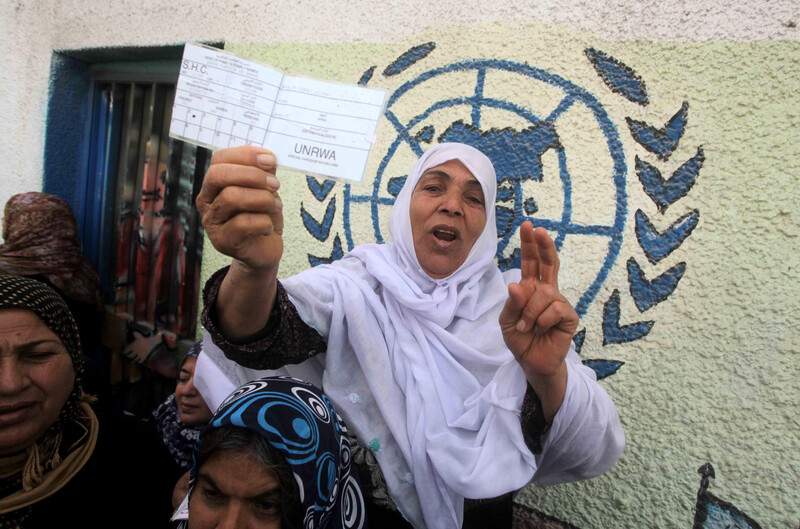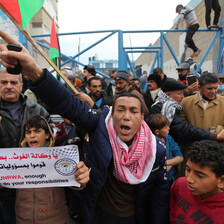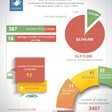The Electronic Intifada Gaza City 11 April 2013

Palestinian women protest UNRWA service cuts in Gaza City.
APA imagesGAZA (IRIN) - UN-run relief and distribution centers in Gaza, which provide food to around 25,000 people a day, reopened this week after guarantees were given about the security of staff.
The UN agency for Palestine refugees (UNRWA) was “forced to close its distribution and relief offices last week due to ongoing demonstrations that affected its operations, a regrettable decision that hindered the agency’s ability to provide much-needed services and relief supplies to Palestine refugees in Gaza,” the agency said in a statement.
Several hundred Palestinian refugees have been protesting outside the UNRWA office in Gaza since early last week, following cuts to a cash assistance program.
Protests against the cuts turned violent on 4 April, when demonstrators stormed the office, leading to the closure of all relief and distribution centers in the Gaza Strip, which together provide assistance to more than 800,000 people.
“Based on the assurances UNRWA in Gaza received from different local [leaders], the agency will reopen its installations across the Gaza Strip,” said the statement.
“While UNRWA understands the frustration of the population, heightened by the tightened blockade on the Gaza Strip, and respects the right to peaceful demonstrations, UNRWA must ensure the safety and security of its staff,” it continued, adding that the centers would again be closed if staff or facilities faced further threats.
The thousands of refugees who depend on food aid had been worried by the closure of the centres.
“Refugees need these centers to be reopened very soon — people will suffer more and more if they stayed closed,” refugee Ziyad Yousef, 27, said before the reopening was announced.
He said he was disappointed that things had turned violent last week, but said he urged UNRWA “to look into all possible solution not to cut more services, because this will harm refugees and add more hardships to their lives.”
Cuts
At the heart of the dispute is the end of a cash assistance grant worth about $40 per year that went to the members of around 21,000 families in Gaza, which UNRWA could no longer afford.
The agency sought to mitigate the impact of the grant’s termination with a threefold increase in spending on its job creation program.
“There was simply no way to continue the cash program and also to continue to provide high-quality education,” UNRWA’s head of operations in Gaza, Robert Turner, said.
Education costs are rising; 7,000 to 8,000 new school children register each year at the UNRWA-run schools in Gaza. New funding has not been forthcoming. The agency’s General Fund has a deficit of $67.2 million.
Funding stagnated
UNRWA was established in 1949 to provide assistance to Palestinian refugees. Despite a continuous increase in the number of registered refugees — there are currently 1.2 million in Gaza, expected to reach 1.6 million by 2020 — UNRWA’s funding has stagnated.
“There is a hope that the poor people will see their aid restored,” Mo’een Abu Okal, chief of the refugee public committee in Gaza, said, referring to the cash assistance program. He was involved in the discussions with UNRWA over reopening the distribution centers.
He said the centers should never have been closed and that the decision had “added to their miseries.” He said the protests would continue, peacefully, until the cuts were reversed.
The Geneva-based organization Euro-Mid Observer said the agency should work harder to raise more funds. “UNRWA is required to carry out its responsibility, and exert greater efforts with the international community and donor countries in order to maintain the levels of its humanitarian aids,” it said in a statement (“Euro-Mid demands UNRWA to reopen relief centers in Gaza immediately,” 6 April 2013).
Protests continue
Despite the reopening of food centers, some demonstrators continued to protest, notably at a UNRWA distribution center in Rafah, close to Gaza’s border with Egypt, where UNRWA staff were blocked from entering their building.
On 8 April, protesters outside the main UNRWA office for Gaza managed to prevent cars from entering the compound. Local police maintained a heavy presence to keep the protest organized and avoid any further incidents.
Salah Yaghi, 49, came from Jabaliya refugee camp in northern Gaza to take part in the protests. “My old small house is falling down, and I have a disabled daughter. We don’t have a source of income, and I can’t send my sons to college because of our situation. Therefore, I came here with my neighbors and hundreds of people who are looking for better life.”
Earlier in the week, UNRWA called on the authorities in Gaza to provide the needed protection to UNRWA staff and workers and to ensure the protests remain peaceful. Hamas, the ruling authority in Gaza, had urged UNRWA to reopen the centers, and spokesman Sami Abu Zuhri said they were providing protection.
“We in Hamas and the government are preventing entry [of protesters] to UNRWA headquarters in Gaza,” he told local media. “We are providing appropriate conditions for UNRWA’s work,” he was quoted as saying by the Gaza government-run Al-Ray media agency (“Hamas urges UNRWA to reconsider food aid suspension,” 6 April 2013).
Youssef, who runs a small grocery story close to the Beach camp distribution center, said he was eager to see the UNRWA centers reopen.
“People are living in a difficult situation; it’s getting worse with such reduction. For the sake of the poor refugees, all sides need to find a solution to end the suffering and to give us a better look toward the future.”
This item comes to you via IRIN, a UN humanitarian news and information service, but may not necessarily reflect the views of the United Nations or its agencies. All IRIN material may be reposted or reprinted free-of-charge; refer to the copyright page for conditions of use. IRIN is a project of the UN Office for the Coordination of Humanitarian Affairs.


